We are delighted to announce that this year’s MiSP conference, on the theme of ‘Teaching Mindfully’, will be taking place online via video conferencing on Saturday 20th June 2020.
Originally planned as a face-to-face event in London, we are moving our conference online to ensure as many people as possible will be able to attend and to protect the health of all delegates and speakers.
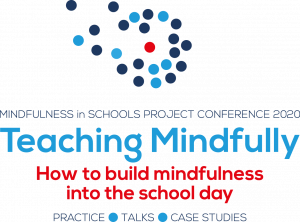 It will be a wonderful day where you can listen to our inspirational speakers, hear case studies from teachers in a variety of settings as well as take part in some short mindfulness practices. Timetabled to include frequent breaks from your screen, we hope that this event will be a rich experience for our community and an exciting opportunity to hear from some of the field’s thought leaders and champions.
It will be a wonderful day where you can listen to our inspirational speakers, hear case studies from teachers in a variety of settings as well as take part in some short mindfulness practices. Timetabled to include frequent breaks from your screen, we hope that this event will be a rich experience for our community and an exciting opportunity to hear from some of the field’s thought leaders and champions.
All proceeds will fund Mindfulness in Schools Project’s charitable work and tickets are available at the following prices:
- General Admission £25
- Hub Member £15
- Student £10
Buy your ticket now! Speakers already announced include:
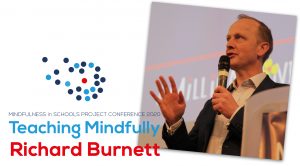 Richard Burnett
Richard Burnett
Richard is co-founder of Mindfulness in Schools Project and co-wrote .b, MiSP’s flagship mindfulness course designed to engage adolescents in the classroom.
Richard is a teacher at Tonbridge School, the first school in the UK to put mindfulness on the curriculum, an event covered broadly by the media in 2010. Since then he has taught mindfulness to well over a thousand adolescents – in classrooms, science labs, libraries, theatres, carparks and fields, and at virtually every time of day.
Richard’s TEDx talk helped define the landscape of mindfulness in education and he was an expert witness at the All-Party Parliamentary Group on Mindfulness. He has appeared regularly at conferences, on TV, on radio and in the national and local press to make the case for mindfulness in education.
Having spoken to hundreds of teachers across the educational landscape about the challenges of implementation in schools, Richard will share a sometimes provocative top 5 list of insights for anybody who teaches or wants to teach mindfulness in schools.
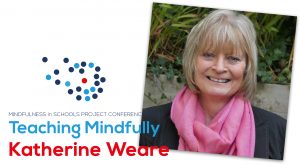 Katherine Weare
Katherine Weare
Katherine Weare is Emeritus Professor at the University of Southampton and Honorary Visiting Professor at University of Exeter. Katherine is known internationally for her work on mental health and wellbeing and social and emotional learning, most recently focusing on mindfulness and compassion based approaches in education. She has published widely, engaged in cutting edge research projects and reviews of the evidence base for the field, advised the UK government, EU and WHO, and developed practical strategies across most European countries.
Katherine’s talk at our 2020 Conference will explore the lived experience of teachers who have allowed mindfulness into their lives, their classrooms and schools and discovered its profound and transformative effects, including on the very essence of what matters to them, their role, and their relationships. She will suggest that this experience may help show us the way to build on the current, and very useful, model of mindfulness as ‘an evidence based intervention’ and a ‘helpful tool’ to develop its radical capacity to cultivate presence, wisdom, compassion and ethics and to place these qualities at the heart of everything we do, and are, both as teachers and as concerned members of a society in crisis.
Katherine was a lead player in the influential Social and Emotional Aspects of Learning (SEAL) programme in the UK, and in the European Network of Healthy Schools, helping cultivate holistic and empathic approaches in education which put social and emotional learning and wellbeing at the heart of the educational process, for students and staff. She has been an advisor to Mindfulness in Schools Project since its outset, and was a co-author on an influential research paper that helped pave the way for the major Myriad project. Her recent book, co-written with Zen Master Thich Nhat Hanh Happy Teachers Change The World: A Guide to Cultivating Mindfulness in Education has been translated into five languages and is widely used in schools and universities across the world. She is has recently been appointed co-lead for Education Policy for the UK Mindfulness Initiative and is also Principle Investigator with Mind and Life Europe developing a new Community of Contemplative Education in Europe.
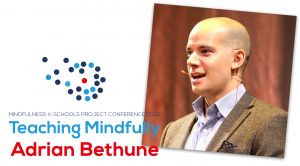 Adrian Bethune
Adrian Bethune
Adrian is a part-time teacher at a primary school in Hertfordshire and delivers wellbeing-focused training in schools across Europe through his organisation www.teachappy.co.uk.
In 2012, Adrian was awarded a ‘Happy Hero’ medal by Lord Richard Layard at the House of Lords for his work on developing wellbeing in schools. In 2015, he was invited to speak at the Action For Happiness event, Creating A Happier World, on stage with the Dalai Lama.
Adrian is author of the award-winning, Wellbeing In The Primary Classroom – A Practical Guide To Teaching Happiness (Bloomsbury, 2018). He writes regularly for the TES and has contributed to several other books including Global Perspectives in Positive Education (John Catt, 2018), Children and Young People’s Mental Health Today (Pavilion, 2019), and Just Great Teaching (Bloomsbury, 2018).
At our 2020 conference, Adrian will address the question: ‘Could mindfulness be the key to changing the education system?’
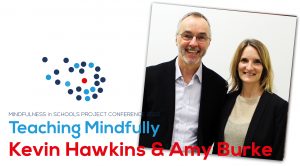 Kevin Hawkins & Amy Burke
Kevin Hawkins & Amy Burke
Kevin has worked with adolescents and young people in various contexts for over 30 years – as teacher, school head, and social worker in the UK, Africa, and Europe. He currently lives in Valencia, Spain and was previously in the Czech Republic where for 10 years he was Middle School Principal at the International School of Prague.
Kevin trained in mindfulness in Europe and the USA with Mark Williams (Oxford Mindfulness Centre), Jon Kabat-Zinn, Saki Santorelli and Florence Meleo-Meyer (UMass Medical School, Centre for Mindfulness), and with Dr. Amy Saltzman (Still Quiet Place) and he has taught mindfulness to students, teachers and parents since 2008. In 2012 Kevin co-founded MindWell, (mindwell-education.com) which supports educational communities around the world in developing wellbeing through mindfulness and social-emotional learning.
Kevin is a Senior Trainer for Mindfulness in Schools Project and a facilitator of the evidence-based CARE program (Cultivating Awareness and Resilience in Educators). He has also worked as a coach/mentor to school leaders and was lead consultant to the International Baccalaureate Organisation on SEL and mindfulness in 2015. Kevin is a regular speaker, writer and presenter on the topics of wellbeing, leadership, mindfulness and social and emotional learning in education. Kevin’s first book, Mindful Teacher, Mindful School: Improving wellbeing in teaching and learning, was published by SAGE in July 2017. He is currently working on a second book, also for SAGE/Corwin with Amy Burke which will be published in early 2021.
Amy is an educational consultant who spent 15 years as a high school teacher and guidance counsellor in Canada and The Netherlands. She holds a Masters Degree in Contemplative Education from Naropa University and in 2012 she co-founded MindWell (mindwell-education.com) whose aim is to support educational communities in fostering wellbeing through mindfulness and social-emotional learning.
Amy is a lead teacher trainer for Mindfulness in Schools Project and has completed curriculum training with Gina Biegel (MBSR-T) and Dr. Amy Saltzman (Still Quiet Place). Amy is also a facilitator for the CARE program (Cultivating Awareness and Resilience in Educators) from the Garrison Institute and supports the Community of Contemplative Education through Mind & Life Europe. She is also a Mentor for Inward Bound Mindfulness Education (iBme, UK) teen retreats. Amy works internationally in schools and universities providing workshops and retreats for educators, students and parents with a focus on self-care and stress management.
At our Conference Kevin and Amy will explore how ‘Being Mindful’ naturally leads us to ‘Teaching Mindfully’ and how we can nurture this ability to bring mindful awareness into our lives and our work. Drawing on research from social neuroscience and its implications for educators, they will focus on three areas of:
- Slowing down
- Optimizing the learning environment
- Impacting individual students
By reminding us of the power and value of teachers and teaching they will point to the deeper changes that mindful approaches to learning help foster in our schools: A shift in the focus of education that can help develop students who are more aware, more reflective and more able to take care of themselves, each other and the planet.